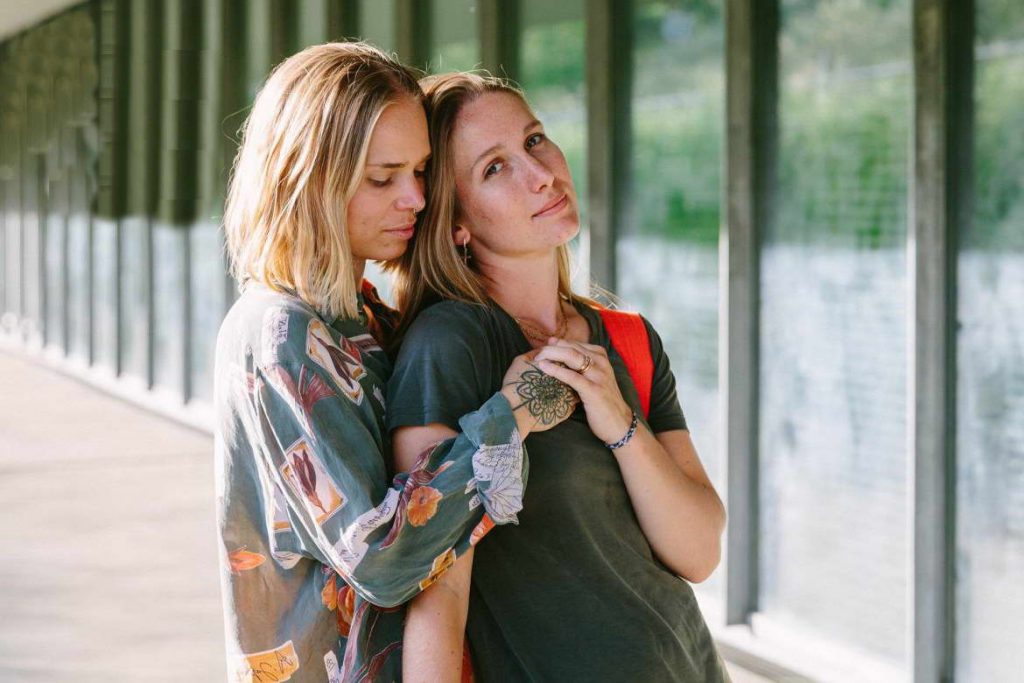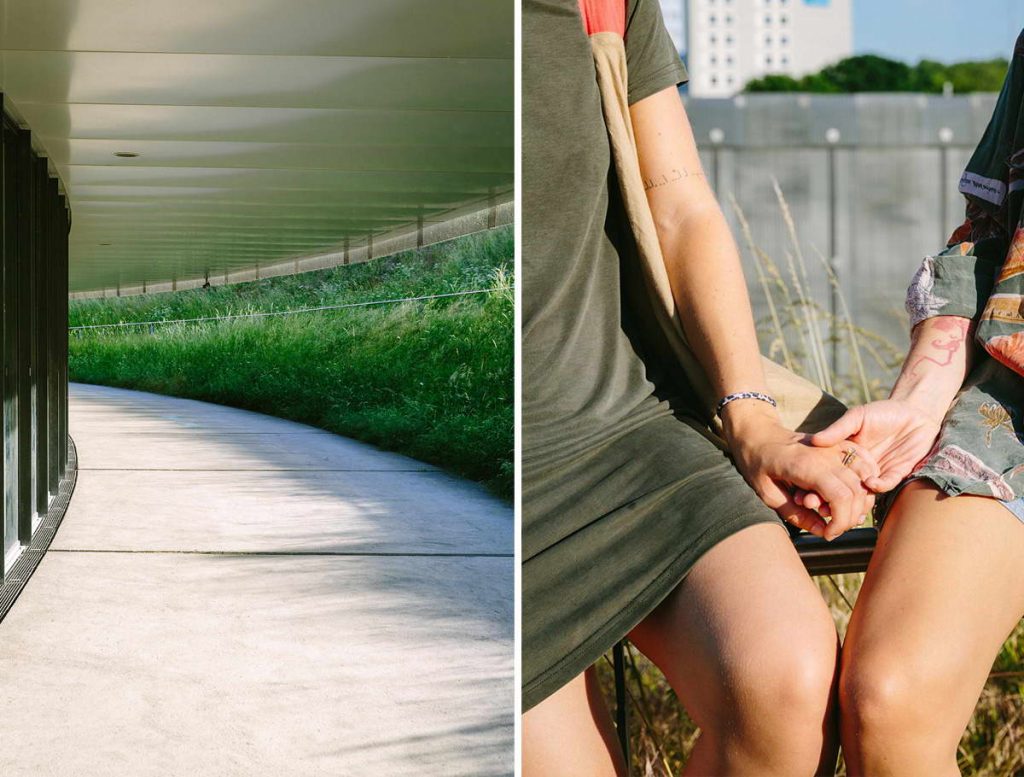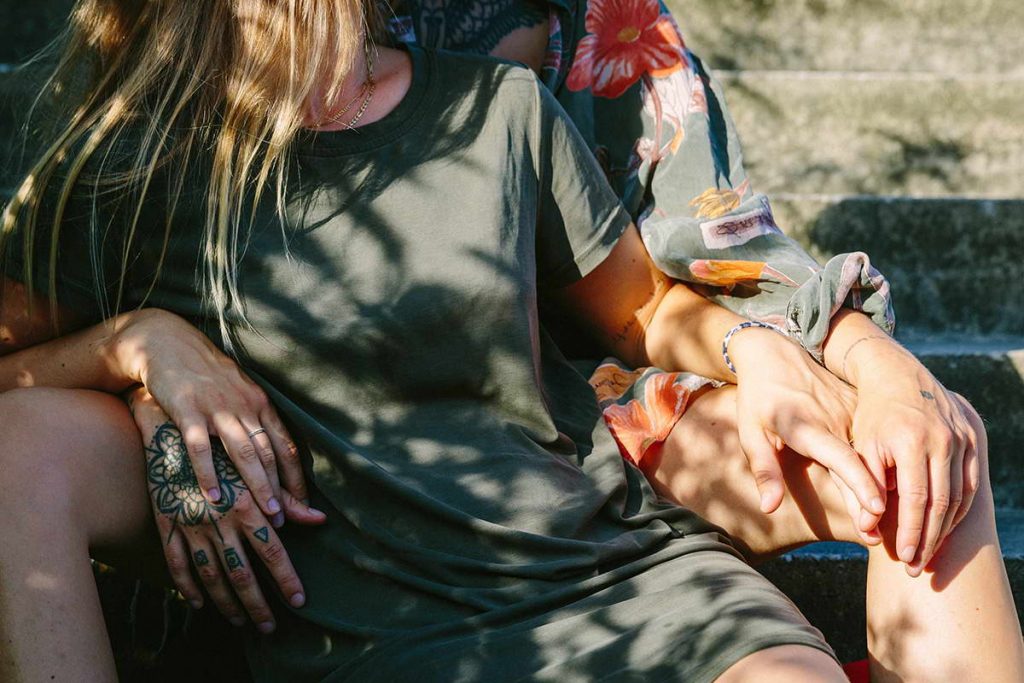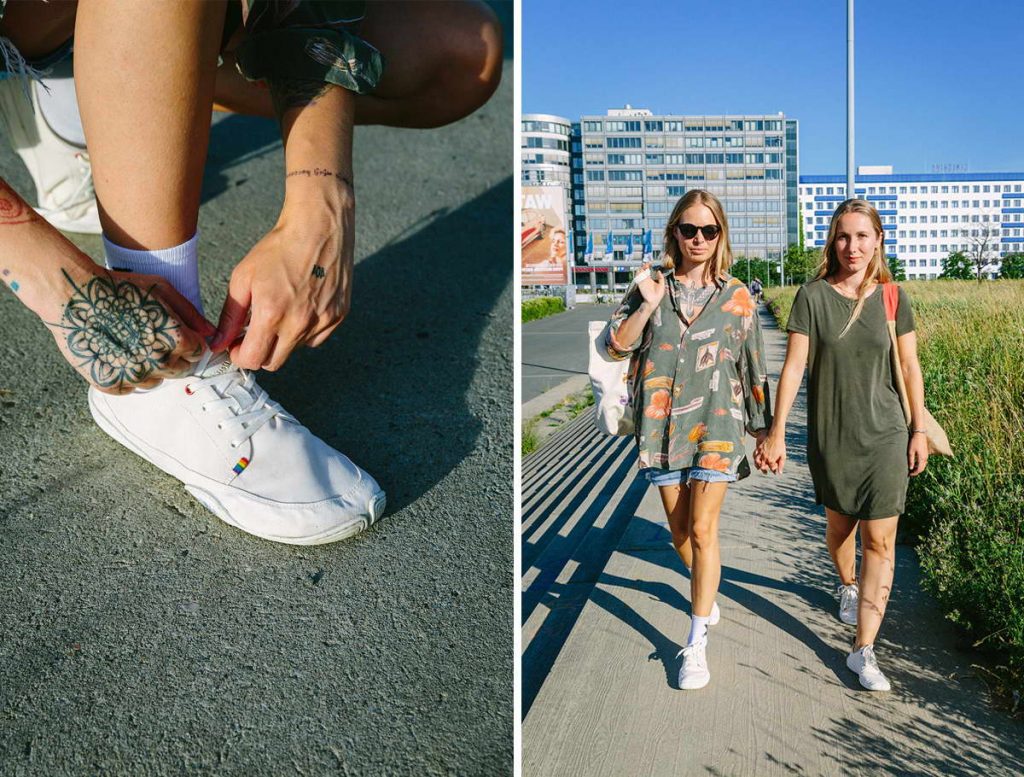There are many unsustainable brands that quickly release something with a rainbow for Pride Month and otherwise don’t care about the community at all. We think that’s stupid, of course.
For our colourful and cosmopolitan editorial, who campaign for equality, sustainability and justice in a variety of ways, we were able to win Vice-Miss-Germany and activist Clare and her charming wife Emmily. The two of them model the barefoot shoe with the rainbow flag and Clare talks to us about prejudices, stereotypes, equality and having children, which will soon be on their program.
The shoe is by the way not a limited Pride merchandise item, as you unfortunately see too often, but comes back to the shop every summer. And shows what the company is so committed to: visibility and diversity. The idea of the Pride shoe originated in the community and has inspired so many people that this favourite shoe is no longer a one-off.
 The shoe is not a Pride merchandise item, as you unfortunately see it far too often, but rather shows what the company is so committed to: visibility and diversity.
The shoe is not a Pride merchandise item, as you unfortunately see it far too often, but rather shows what the company is so committed to: visibility and diversity.
The small rainbow flag adorns the left shoe, on the side of the heart, as a symbol of tolerance and acceptance as well as the appreciation of diverse forms of life and not only becomes a place for happy feet, but also makes a statement.
Clare, how did your own outing go, or do you think that is a question that should be asked today?
At some point, in an imaginary future, it would be nice if we no longer have to come out. Right now it is the case that our generation still has to do that so that the generations afterwards may not have to come out.
At some point, in an imaginary future, it would be nice if we no longer have to come out.
I came out when I was 22. Before that, I was also with men, including my ex-boyfriend for a long time. But it was always clear to me that, before I got married, I would like to sleep with a woman, just to know if it wasn’t for me after all.
Then I met my first girlfriend back then and called my parents to tell them that I was in love. My parents were both really happy, then I said: “Her name is Sandy.” Then there was silence for a while. (Laughs.)
But they caught up relatively quickly and now absolutely love my wife Emmily – she is like a second daughter to them. Fortunately, my outing was very relaxed, also among my friends, I believe that many people really have to experience worse things in this regard.
Unfortunately, such an outing does not only take place once in life, but theoretically you have to come out to other people every day.
Unfortunately, such an outing does not only take place once in a lifetime, but theoretically you have to come out to other people every day. And that’s a shame, because straight people don’t have to come out either. They don’t have to say in every conversation: “By the way, I like the opposite sex.”
Do you sometimes feel that you have to justify yourself for being queer in front of others?
Yes, I definitely have to give reasons. For example, if you are approached by a man who does not accept “No”, the first excuse is often: “I have a boyfriend.” That pulls off. When I say that I am married to a woman, it is often not so easily accepted by cis men.
I think it is also a global problem that a woman is not accepted if she does not have a husband. Then it is immediately worth less. And that is incredibly sad.
Has the outing changed something for you in your self-image? How did that feel to you?
I’m actually trying not to give myself a label at all. There are many people who are sure to put themselves in a drawer. Not for me personally, I don’t want to restrict myself there. Because I can’t promise anyone that in twenty years I’ll still be married to my wife. Maybe then I’ll be asexual, pansexual, who knows?
I try not to give myself a label. There are many people who are sure to put themselves in a drawer. Not for me personally, I don’t want to restrict myself there.
Right now I’m into women. And so I try to repeat it over and over again and I don’t like to position myself as lesbian or bi. I just keep saying I’m queer and the rest, I think, is totally private and intimate. It’s always the kind of thing that other people expect to be told, even though it’s not the other way around.
Same-sex does not automatically mean equal. How do you two live equality?
In fact, we also fall relatively heavily into such heteronormative stereotypes. We try to live away from stereotypes in the first place, but because of my job, I’m the one who is at home with the dogs all day. I wash, I cook and I take care of the household and Emmily comes home in the evening and puts her feet on the table. (Laughs.)
But basically equality applies to us in everyday life. Not one of us always pays the bill, holds the door open or likes to go to the hardware store, but we are both equal in our marriage.
Basically, equality applies to us in everyday life.
 Right now with the child planning, we are right in the middle of it, I should have the child, but my wife will stay at home with the child. There is no discussion at all, we do not have the situation where a man earns more and therefore continues to work. We both earn well and we can choose. Emmily stays at home for the time being and maybe I’ll stay at home six months later, we’ll see.
Right now with the child planning, we are right in the middle of it, I should have the child, but my wife will stay at home with the child. There is no discussion at all, we do not have the situation where a man earns more and therefore continues to work. We both earn well and we can choose. Emmily stays at home for the time being and maybe I’ll stay at home six months later, we’ll see.
Do you think that equality is easier to implement in a non-heteronormative relationship?
I guess so. I also noticed that in my previous heteronormative relationship. My boyfriend at the time earned more than me and if we had had a child, then I would definitely have stayed at home. Because we couldn’t have afforded it any other way.
I also know a lot of dads who would like to be at home on parental leave and go to daycare for parents’ evenings and organize children’s birthdays – but the family simply cannot afford that. And that is known to be a structural problem. Men earn significantly more and when you also have financial responsibility for a child, it often makes more sense for the man to go to work and the woman to stay at home.
I know a lot of dads who would like to be at home on parental leave and go to day-care for parents’ evenings and organize children’s birthdays – but the family simply cannot afford that.
But I think if we have a relationship in which both earn a lot, then you can choose. But that’s a privilege and not everyone is lucky enough to be able to choose so freely.
In your opinion, what would have to be done to change this structural problem in the future?
If we all had the same conditions, we would be free to choose who would like to stay at home. It has a lot to do with employers, that they have to create these conditions. And not just the same salary, but also the same opportunities for re-entry and parental leave. That should be natural and normal. I think changes like this have to get going first and then it will become rooted relatively quickly that many men also like to stay at home.
How are you as a couple perceived from the outside? Are there often prejudices that you encounter?
Indeed, we often struggle with being seen as sisters. We’re both blond, similar in height and weigh similarly, but that’s where it ends. I think that has a lot to do with the “lesbian” stereotype or the “bi” stereotype, that one thinks that one of the two women has to look particularly masculine. And of course that’s not true.
I know a lot of same-sex or queer couples who do not correspond to these stereotypes and who are then not perceived as a couple. We often have to explain our sexuality and also our identity, somehow still have to say something about it.
We often have to explain our sexuality and also our identity, somehow still have to say something about it.
And I often notice how we live in this Berlin bubble and how queer in other areas and countries is just not that far. We are at least allowed to live out our sexuality in Germany, but still it is often not made easy for us.
Do you have the feeling that this awareness is also a generation issue?
I don’t think so. Queer couples have always existed, even if it was not so easy for them to talk about it and act it out. I think it has a lot to do with the place where you live, but also a lot with education. Not at all related to “stupid” or “clever”, but simply people who are not educated in the field, that they know that there is something far beyond stereotypes.
We see that every day on social media. There are still people among Pride contributions who comment that this is disgusting or that God does not want it that way. Awareness of diversity, like general knowledge, should find a place and be communicated in all subjects, and that at a young age, for example through children’s books.
How do you feel when brands campaign for more visibility and diversity in Pride Month? Do you perceive this as positive or do you also see it critically?
I have a relatively clear opinion on this. A distinction has to be made between marketing measures and rainbow washing on the one hand and companies that support queer people beyond June.
A distinction has to be made between marketing measures on the one hand and companies that support queer people beyond June.
 We don’t have a CSD this year and there are many brands that actually don’t do a queer campaign for this reason. You don’t have a CSD truck, you can’t use it to draw people’s attention and that’s why you leave it entirely. For me, that’s a big red flag when a company only does this for its own profit. Then I don’t need this visibility.
We don’t have a CSD this year and there are many brands that actually don’t do a queer campaign for this reason. You don’t have a CSD truck, you can’t use it to draw people’s attention and that’s why you leave it entirely. For me, that’s a big red flag when a company only does this for its own profit. Then I don’t need this visibility.
But of course there are also brands, who run a campaign with queer people in June and also campaign for more visibility and diversity for the remaining months. There is simply much more to them than that. They advocate long-term financial support for the LGTBQIA + community and, as a company, take a clear stance in their actions and work. And then I’m the biggest fan of such campaigns.
